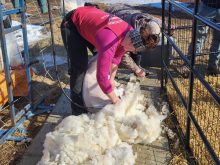GREAT FALLS, Mont. – As a major player in the world grain trade, the United States must accept it cannot force other nations to acquiesce on all trade matters.
“The U.S. is not the huge bully in the world who gets everything it wants,” said the president of the Montana Grain Growers.
American agriculture’s survival depends on a freer trade environment, said Randy Johnson during a meeting of farm leaders held in Great Falls. They met to discuss upcoming world trade negotiations and its impacts on their region.
Read Also

Charges laid after cattle theft
Saskatchewan RCMP lay two charges against a man after six cattle went missing.
“If we want to sell our wheat, we have to participate,” said Johnson during a meeting of farm leaders.
” Agriculture has been somewhat misled thinking they have an option or a decision as to whether they participate in the WTO (World Trade Organization) and trade liberalization. A policy of isolation is passŽ in a free-trading world, he said.
Still, some American producers see no benefit in free trade because their incomes continue to drop as commodity prices shrink every year.
Protectionist attitude
Grain analyst Colin Carter of the University of California criticized a cry for more protection.
“The United States is very protectionist in its commitments to agriculture. Its hands are just as dirty as the Europeans,” he said.
Carter, an Alberta transplant, told the farm leaders that trade is not a war and the Americans must co-operate like everyone else.
Americans say they want export and domestic subsidies stopped, no tariffs and an investigation into state trading agencies. However, the U.S. goes into upcoming trade talks with a stained reputation because it continues to support its farmers at the same level as the European Union, he said.
Using U.S. Department of Agriculture figures, Carter showed that in 1998, the average full-time American farmer received $19,000 in government support. European farmers received an equal amount. Australians got $3,000 and Canadians $8,000.
He said the U.S. should lower its tariffs on goods like textiles and clothes. That way, countries like China could sell more of these items and buy more American wheat.

















